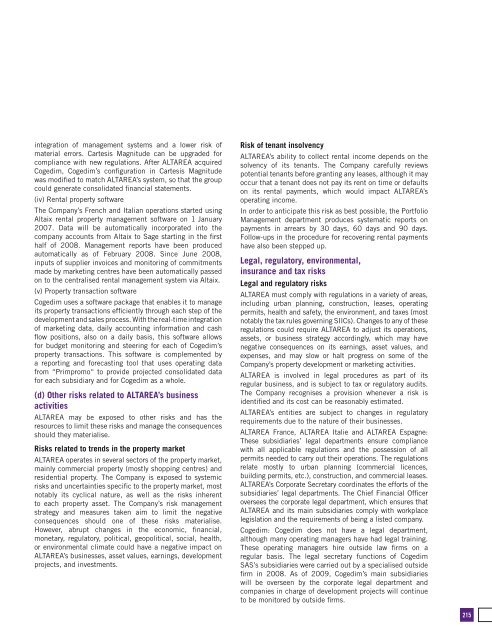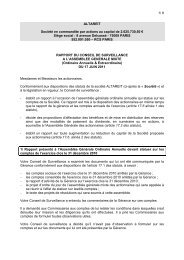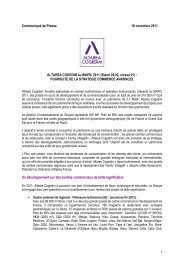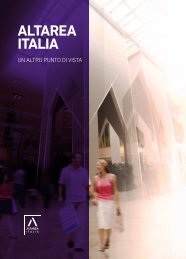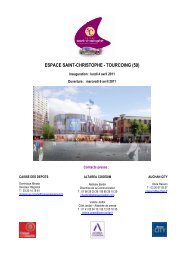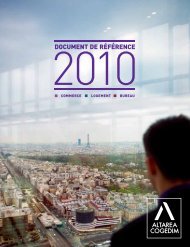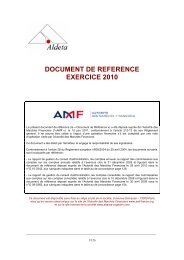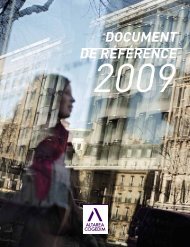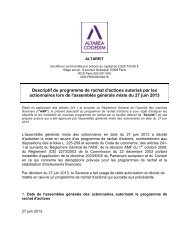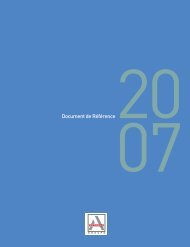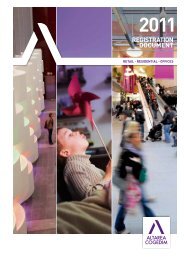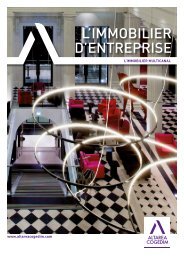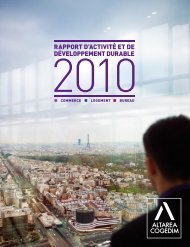Annual report 2008 - Altarea Cogedim
Annual report 2008 - Altarea Cogedim
Annual report 2008 - Altarea Cogedim
Create successful ePaper yourself
Turn your PDF publications into a flip-book with our unique Google optimized e-Paper software.
integration of management systems and a lower risk of<br />
material errors. Cartesis Magnitude can be upgraded for<br />
compliance with new regulations. After ALTAREA acquired<br />
<strong>Cogedim</strong>, <strong>Cogedim</strong>’s configuration in Cartesis Magnitude<br />
was modified to match ALTAREA’s system, so that the group<br />
could generate consolidated financial statements.<br />
(iv) Rental property software<br />
The Company’s French and Italian operations started using<br />
Altaix rental property management software on 1 January<br />
2007. Data will be automatically incorporated into the<br />
company accounts from Altaix to Sage starting in the first<br />
half of <strong>2008</strong>. Management <strong>report</strong>s have been produced<br />
automatically as of February <strong>2008</strong>. Since June <strong>2008</strong>,<br />
inputs of supplier invoices and monitoring of commitments<br />
made by marketing centres have been automatically passed<br />
on to the centralised rental management system via Altaix.<br />
(v) Property transaction software<br />
<strong>Cogedim</strong> uses a software package that enables it to manage<br />
its property transactions efficiently through each step of the<br />
development and sales process. With the real-time integration<br />
of marketing data, daily accounting information and cash<br />
flow positions, also on a daily basis, this software allows<br />
for budget monitoring and steering for each of <strong>Cogedim</strong>’s<br />
property transactions. This software is complemented by<br />
a <strong>report</strong>ing and forecasting tool that uses operating data<br />
from “Primpromo“ to provide projected consolidated data<br />
for each subsidiary and for <strong>Cogedim</strong> as a whole.<br />
(d) Other risks related to ALTAREA’s business<br />
activities<br />
ALTAREA may be exposed to other risks and has the<br />
resources to limit these risks and manage the consequences<br />
should they materialise.<br />
Risks related to trends in the property market<br />
ALTAREA operates in several sectors of the property market,<br />
mainly commercial property (mostly shopping centres) and<br />
residential property. The Company is exposed to systemic<br />
risks and uncertainties specific to the property market, most<br />
notably its cyclical nature, as well as the risks inherent<br />
to each property asset. The Company’s risk management<br />
strategy and measures taken aim to limit the negative<br />
consequences should one of these risks materialise.<br />
However, abrupt changes in the economic, financial,<br />
monetary, regulatory, political, geopolitical, social, health,<br />
or environmental climate could have a negative impact on<br />
ALTAREA’s businesses, asset values, earnings, development<br />
projects, and investments.<br />
Risk of tenant insolvency<br />
ALTAREA’s ability to collect rental income depends on the<br />
solvency of its tenants. The Company carefully reviews<br />
potential tenants before granting any leases, although it may<br />
occur that a tenant does not pay its rent on time or defaults<br />
on its rental payments, which would impact ALTAREA’s<br />
operating income.<br />
In order to anticipate this risk as best possible, the Portfolio<br />
Management department produces systematic <strong>report</strong>s on<br />
payments in arrears by 30 days, 60 days and 90 days.<br />
Follow-ups in the procedure for recovering rental payments<br />
have also been stepped up.<br />
Legal, regulatory, environmental,<br />
insurance and tax risks<br />
Legal and regulatory risks<br />
ALTAREA must comply with regulations in a variety of areas,<br />
including urban planning, construction, leases, operating<br />
permits, health and safety, the environment, and taxes (most<br />
notably the tax rules governing SIICs). Changes to any of these<br />
regulations could require ALTAREA to adjust its operations,<br />
assets, or business strategy accordingly, which may have<br />
negative consequences on its earnings, asset values, and<br />
expenses, and may slow or halt progress on some of the<br />
Company’s property development or marketing activities.<br />
ALTAREA is involved in legal procedures as part of its<br />
regular business, and is subject to tax or regulatory audits.<br />
The Company recognises a provision whenever a risk is<br />
identified and its cost can be reasonably estimated.<br />
ALTAREA’s entities are subject to changes in regulatory<br />
requirements due to the nature of their businesses.<br />
ALTAREA France, ALTAREA Italie and ALTAREA Espagne:<br />
These subsidiaries’ legal departments ensure compliance<br />
with all applicable regulations and the possession of all<br />
permits needed to carry out their operations. The regulations<br />
relate mostly to urban planning (commercial licences,<br />
building permits, etc.), construction, and commercial leases.<br />
ALTAREA’s Corporate Secretary coordinates the efforts of the<br />
subsidiaries’ legal departments. The Chief Financial Officer<br />
oversees the corporate legal department, which ensures that<br />
ALTAREA and its main subsidiaries comply with workplace<br />
legislation and the requirements of being a listed company.<br />
<strong>Cogedim</strong>: <strong>Cogedim</strong> does not have a legal department,<br />
although many operating managers have had legal training.<br />
These operating managers hire outside law firms on a<br />
regular basis. The legal secretary functions of <strong>Cogedim</strong><br />
SAS’s subsidiaries were carried out by a specialised outside<br />
firm in <strong>2008</strong>. As of 2009, <strong>Cogedim</strong>’s main subsidiaries<br />
will be overseen by the corporate legal department and<br />
companies in charge of development projects will continue<br />
to be monitored by outside firms.<br />
215


